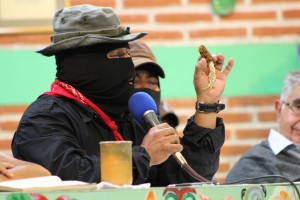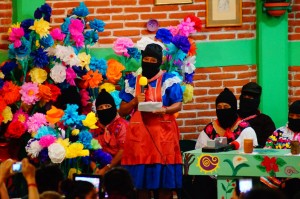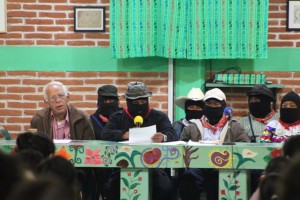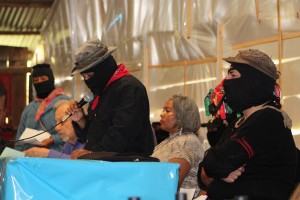
Autonomy and Resistance
Political Economy from the Zapatista Communities II. Words by Subcomandante Insurgente Moisés. 5 May 2015
See also: Full coverage of the Seminar “Critical Thought vs. the Capitalist Hydra”
Political Economy from the Zapatista Communities II
Words by Subcomandante Insurgente Moisés. 5 May 2015
Listen here:(Descarga aquí)
Good afternoon to everyone, compañeras, compañeros, brothers and sisters.
In response to what we have been listening to yesterday, and the day before, we have been commenting in the commission of compañeros and compañeras of the CCRI, that it seems to us that you can see there what it is that we want to do. This is the reason all of us are here, and if we haven’t been dreaming or sleeping, then we are thinking about the things that we have discussed, what the compas and brothers and sisters already brought up and talked about. They have already told us a lot about what this hydra is. So the question is what do we need to do against it?
Organize ourselves. When we give this response, organize ourselves, it means that our brain is already telling us what must be done first, and then second, and third, and fourth, and so on. And so, it’s an idea, when it is in your head it is an idea. Now, when you move your tongue, then it is in your words. What is still missing is action, that is, to organize. Now when you are organizing yourselves, watch out, because it isn’t going to come out like you thought in the idea, or like you said in the word. You are going to begin to encounter a lot of barriers, a lot of challenges.
Political Economy from the Perspective of the Communities I. Subcomandante Insurgente Moisés. 4 May 2015
Words by Subcomandante Insurgente Moisés (4 May 2015)
Seminar “Critical Thought vs. the Capitalist Hydra”
Listen here:
(Descarga aquí)
Good afternoon compañeros, compañeras.
What I’m going to talk to you about—not read to you—has to do with what the economy was like and is like in the communities, that is, I’m going to talk to you about capitalism. I’m going to talk to you about how it was 30 years ago, 20 years ago, and in these past few years. I’m going to speak to you about this in three parts: how the communities lived before, 30 years ago; how those who are not organized as Zapatistas live today; and then about how we live, we the Zapatistas of today.
This isn’t to say that we don’t know how it was centuries ago; we do know. But we want to demarcate things from here because we are 30 years old—starting from ’83, the year 1983 when the group of compañeros arrived, and so from that date to now, we are 30 years old.







